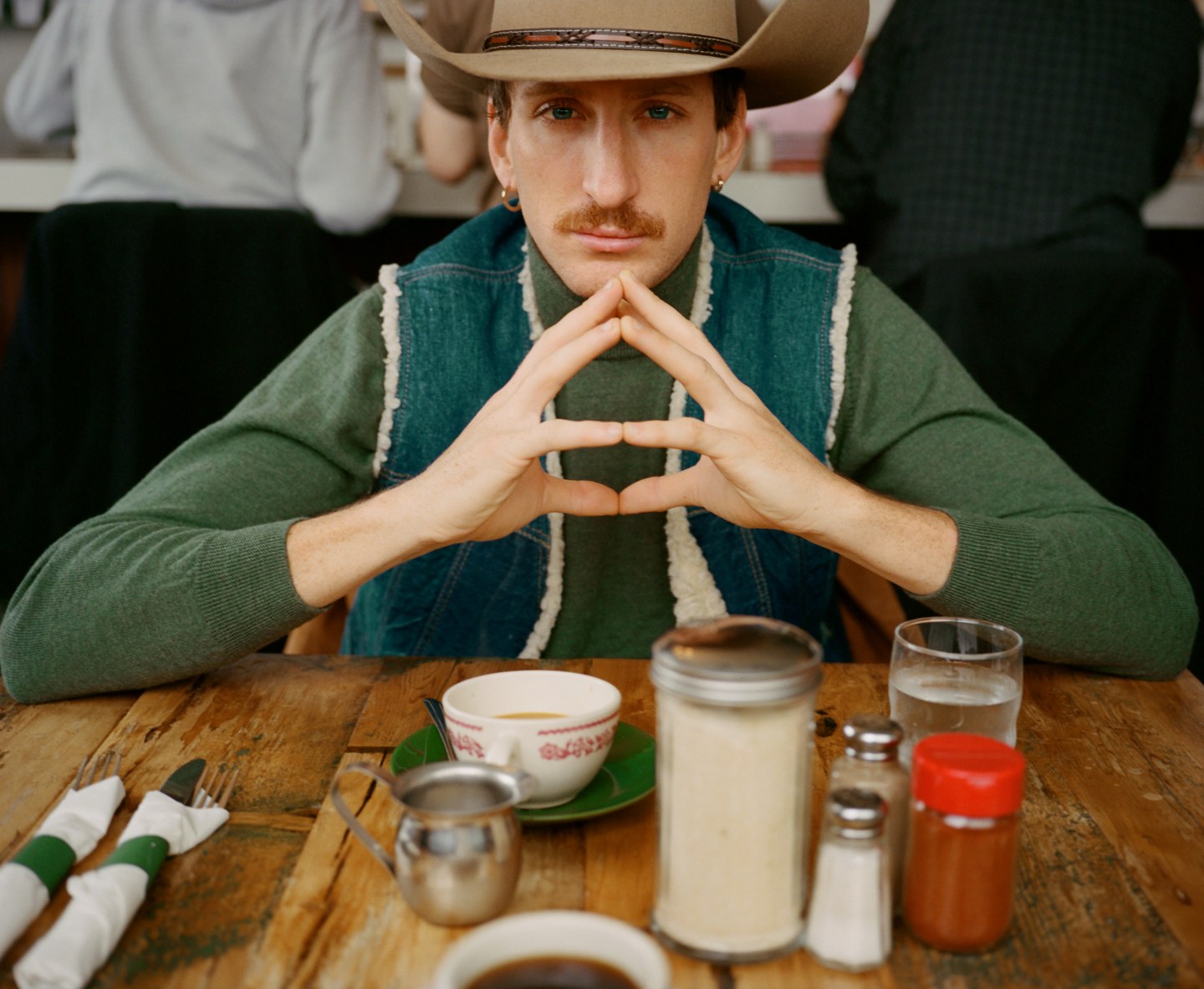 Kirin J Callinan.
Photo by Tex Crick
Kirin J Callinan.
Photo by Tex Crick
There’s Kirin J Callinan on the front cover of his new record Bravado, lying down and appearing to piss in his own mouth, wearing the expression of a petulant toddler. On the inside of the record’s vinyl gatefold he appears completely nude and spackled with bronzer, the spread resembling a bootleg Playgirl centerfold retrieved from a radioactive dump in the desert of Callinan’s native Australia. On Instagram, Callinan announced his sophomore album with a proud celebration of its all-caps “TRASH” – an unmistakable element of Bravado, but one that doesn’t overwhelm its entrancing convergence of left turns, laughs, and lumps in throats.
When we speak over the phone, Callinan acknowledges Bravado disorienting sound, but assures me his goal wasn’t something divisive. The reference points were “anything 80s” and modern chart-toppers, with a frequent return to weirdo PLUR rave circa David Guetta, and lots of guests including Weyes Blood, Owen Pallett, and Mac DeMarco. “With every decision I made, I picked the least-tasteful option,” he admits, because that’s where inspiration formed. Still, nothing about Bravado comes off as considered – it was created by a trickster, as summarized by Lewis Hyde: “a master of the kind of creative deception that… is a prerequisite of art… at once culture hero and fool, clever predator and stupid prey.”
A pop song can be immediately discarded by the public if it’s not immediately sincere about something from the very first note. Once you accept Bravado’s obnoxious exterior as honest – and yes, brave – the record’s humanity is unlocked. Repeat listens reveal Bravado as one of the most addictive and affecting pop records of the year, a deeply personal work and appeal to the world. With a bit of focus, you can appreciate the smelly shit Bravado is grown in alongside the fresh crop of unique songs that emerges from it.
Today, The FADER is premiering the video for the Bravado single “Living Each Day.” Recorded over a couple of days in Mark Ronson’s London studio, the song is a collaboration with Connan Mockasin, another artist bringing absurdity to the singer-songwriter mythos. The central mantra of “live each day like it’s your last” is both venerated as both timeless and empty, depending on your circumstances. It’s a solid companion to Bravado’s previously shared singles: the genuinely tearjerking, Smiths-inflected title track, and “S.A.D.,” the superb party anthem with lounge singer couture and a Rocky hook.
Over email, the clip's director Kii Arens said working with Callinan was "an absolute blast. His 'Shock Crooner' style and full-on performance made every scene really come alive. It’s refreshing to find a frontman that actually performs with style and wit. I hope his performance technique rubs off on the world because it’s a rare thing."
Callinan described a certain affinity with Arens's work. "[F]rom Devo to Dolly Parton which, if I can say so meself, felt like two points on an axis that I existed on, somewhere in between. A true original, Kii excels in walking the line between class n kitch; playful, trashy, with an emotional payoff always."
The FADER spoke with Callinan about the road to Bravado and its various obstacles.
Talk to me about how the journey from Embracism to Bravado began.
I think the spirit of the new record is similar [to the previous one]. I was searching for the same truth and exploring myself and the same ideas, but this time it was a lot more fun. I had a bit more experience. The first record [2013's Embracism], I desperately wanted to be bold and original and at times difficult, with this violent energy and hyper-masculine thing. Which you know, wasn’t fully intended. I just wanted to make the whole thing as extreme as I could. With Bravado, I was just in a lighter place. I had a bit of success with the first record which I didn’t expect, and to have that validation, to tour the world, led me to make something more open-hearted. I wanted this to be conceptually challenging, rather than challenging on the ear. That said, I have this crazy idea that I’m actually making pop music.
Why did so many features end up on the new record?
It wasn’t deliberate, but in a way it became the central theme of the record. As a result of touring and not living anywhere fixed, I met all these people I had a good connection with. It was very natural. Having people like that believe in the record helped me finish it, and to believe in it myself. The process of making this record was filled with self-doubt, that’s why it took as long as it did. People who I played it to were unsure of it, you know, of its bravado, ironically enough. They were insecure about its big, dumb, rude statement. The truth is I like very nuanced and sensitive music as a fan, and I put my critical, cerebral shades on, and all of a sudden I hated my own music. I put it down in 2015, and it hasn’t changed that much at all since then, apart from all the guests coming on. I had to reconnect with the place I was in when I made it, with the fun, and the way that happened was people I respected hearing it, loving it, and coming on board.
What was happening in your life that led you to doubt your own voice?
I think in the artistic process everyone doubts their own work at some stage. There’s no doubt that constant touring takes its toll psychologically as well as physically. It could have been being unlucky in love, who knows. It’s interesting because I was so excited about the album. It was made in such a flurry of excitement. We were in hysterics laughing making these songs, not in a way like they’re jokes, but because it was euphoric. I’m happy to say I’m back in that place now. It was like I flipped a switch and thought “Hang on a sec, this is a masterpiece.” And even if it’s not, I’m gonna choose to believe it.
If it was all a big joke, personally I wouldn’t find it funny at all.
The bravado that this record triple-downs on is something that can lead the listener to wonder if you’re being sincere. Mac DeMarco and Connan Mockasin, who feature on the record, face this criticism routinely. How do you feel about it?
Everything I do is from the heart. None of it is ironic, but just because something is funny doesn’t mean it’s a joke. I love music more than anything, and this record came from that place of love and excitement. It’s not considered at all. That question of sincerity or truth is a funny one, I come back to Alan Vega of Suicide, because that is the realest, truest thing, but for some people it seemed like complete posturing. If it was all a big joke, personally I wouldn’t find it funny at all.
Speaking of music that’s considered, pop music is the genre arguably most guilty of putting market before artistry. Do you find it difficult connecting with it?
No, even if it’s really considered in a sneaky way, it can be quite amazing, and I appreciate that. During the making of this record I was listening to a lot of pop music. The 1975, David Guetta, and then Beyoncé and your general top 40 radio. Pop music tends to be very ambitious, and that’s where I find it attractive.
My new record is the opposite side of the Trump era-pop music coin. Politically, Bravado is more heart, it’s me putting myself out there away from anything that was “cool” about the first record, whether it’s the violence or the industrial electronica kind of thing. I’ve replaced that with cheesy EDM, the pseudo-spiritual ballads, and that’s what I love. With a few tweaks here and there these songs could have been more [broadly] palatable. But I wanted the songs to cut through on their own merits, as well as have that generous feeling. Generational or cultural barriers can be stripped back if you don’t give a shit.
